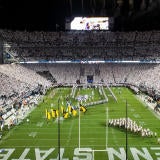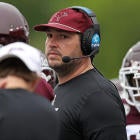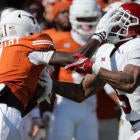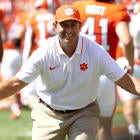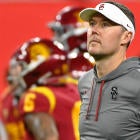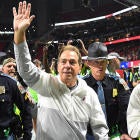
When putting together his first staff as a head coach, Mississippi State's Jeff Lebby had a potential rule change in mind.
This week, the NCAA Division I Council passed a rule, effective immediately, that allows off-field staffers such as analysts, quality control coaches and others to coach players. Previously, schools were limited to 11 countable coaches -- one head coach and 10 assistants -- who could recruit off-campus and provide technical and tactical instructions during practices and games. Despite the proliferation of analysts across college football, they were only allowed to help with game planning.
The rule was expected to pass last year, but the Division I Council surprisingly declined to approve it. However, there was growing momentum this time around that it would pass and coaches hired accordingly.
"We've got pieces in place that felt like this was going to happen," Lebby told CBS Sports.
One area that could benefit the most from the rule change is special teams. More and more schools have made special teams coordinator an off-field, non-recruiting role. In the SEC alone, five of the 16 schools don't have an on-field special teams coordinator, including Kalen DeBoer's first staff at Alabama. There was an inherent risk with that strategy before the rule changed, but now these non-position coach special teams coordinators can be actively involved in coaching players up on game days.
Lebby, who arrived at MSU after a stint as Oklahoma's offensive coordinator, did hire an on-field special teams coach (Cliff Odom) but still used two of his off-field spots to employ coaches with special teams experience in anticipation of the rule change. He also retained Cody Leach, the son of former Mississippi State coach Mike Leach, as a special teams fellow on staff.
"The guys we hired in January, one (Evan Harvey) was a special teams coordinator at (FCS) and he's in the building and has had a bunch of success," Lebby said. "He absolutely helps that piece of it. From an analyst standpoint, we hired Joey Connors, who was a special teams guy at New Mexico State, and now he has the ability to go coach. I think it's going to be incredibly helpful for that phase."
The rule change comes at a fascinating time for college football as athletic departments across the country brace for a new $22 million annual charge in a revenue-sharing world should the landmark House v. NCAA lawsuit settlement be approved. It has prompted some to speculate that the days of the massive analyst armies, made famous by former Alabama coach Nick Saban, could go away as athletic departments become more judicious with expenses and look for discernible return on investment.
"Are we going to grow revenue?" Florida athletic director Scott Stricklin said at the SEC's annual spring meetings. "If you look at it just from a revenue place: By having another coach, another analyst, does it grow our revenue number? I don't think it does."
The flip side of that argument is a belief among some coaches, who unsurprisingly don't want to see football budget cuts, that the top college football conferences could follow the NFL model and have assistant position coaches, especially in critical positions. There could also be value in hiring specialists, such as a quarterbacks coach, to help defray the work of an offensive coordinator juggling multiple position groups.
Lebby is excited to incorporate his 10 off-field coaches more significantly into his system.
"Giving these guys the ability to have more of a voice than they've had, guys that were definitely capable and ready to do that, but now we get to go do it," he said. "I think it's great. I think it's great for young coaches in the profession to be able to develop in a little faster way, create a voice, and get going. That's how we'll do it."


